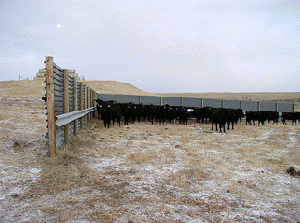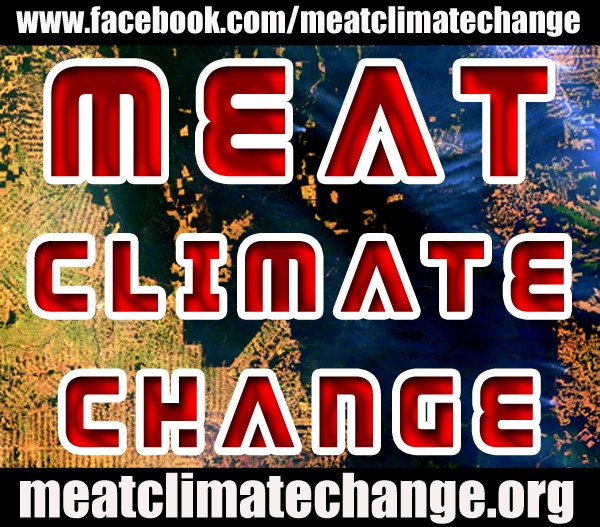
Cattle using a NRCS designed windbreak as part of a grazing plan.
(Image by USDA NRCS South Dakota) Details DMCA
Livestock grazing and feed production are leading causes of topsoil soil loss, land degradation and greenhouse gas emissions. However, skeptics of the large-scare impacts of animal-based agribusiness often cite Zimbabwean farmer, Alan Savory's claim that livestock's damaging effects on soil and the climate can be controlled through "holistic management and planned grazing."
During the 1960s in Africa, Savory was working on national parks, and he blamed desertification on over-grazing by elephants. So he started culling them, and they eventually killed 40,000 elephants, to no avail. This fact does nothing to diminish the reputation of Savory, nor does the fact that he served as a captain of the Rhodesian armed forces. A fellow farmer writes, "History will vindicate Allan Savory as one of the greatest ecologists of all time."1 Remarkably, Savory's 2013 TED talk, 22 minutes in duration including brief questions, has become one of the most touted mitigation strategies for climate change.
Savory's process purportedly allows domesticated herds to act as "a proxy for former herds and predators" in trampling dry grass and leaving "dung, urine and litter or mulch." Savory assert that his process enables the soil to "absorb and hold rain, to store carbon, and to break down methane." His theory to reverse desertification and climate change, and return the atmosphere to preindustrial levels, requires a massive increase in livestock production, as he argues, "There is only one option, I'll repeat to you, only one option left to climatologists and scientists, and that is to do the unthinkable, and to use livestock, bunched and moving, as a proxy for former herds and predators, and mimic nature. There is no other alternative left to mankind."
Irresistible as this explanation may sound to his audience, Savory's theory, process and results are not possible. For example, the massive, ongoing additions of carbon into the atmosphere from human activity far exceeds the carbon storage capacity of global grasslands. So, soil management on grasslands alone cannot reverse climate change, as he illogically argues.
Savory's soil management theory have found little support from agricultural science, and there are many studies critical of his unscientific methods. For example, one point to Savory's many inconsistencies and changing methods. Another accuses him of piecing together false assumptions to produce ineffective but popular recommendations on climate change. Paul Mahony's article, "Livestock and climate: Why Allan Savory is not a saviour," presents a detailed analysis of holistic management, with references to many critical scientific findings.2
For example, research from 13 North American sites, and sites in Africa, found little evidence for any of the environmental benefits which Savory claimed for his methods. And using 14 years of satellite imaging data in South Africa, another study found Savory's intensive grazing practices resulted in lower levels of vegetation than more traditional approaches, when rainfall is included.3 Researchers point out that intensive or cell grazing is only viable where water points are close and labor is cheap. Temporary or permanent fencing is labor intensive, and moving herds daily requires far more labor than most operations can afford.
Repeatedly debunked for over three decades, Savory's reprehensible methods causes severe soil loss, land degradation, and has been a major factor in social conflicts between agriculturalists, traditional pastoralists and urban livestock investors. Nonetheless, Savory and livestock grazing is being promoted by banks, development agencies, free-range and humane-meat advocates, the animal industry, environmentalists and others.
Far from being a solution, animal-based production is an unmitigated climate disaster used to justify environmentally destructive consumption habits. Rather that the desertification caused by Savory's methods, there is massive potential for reforestation in Africa if livestock are removed and the related savanna burning is stopped.4
Excerpt from the book, "Meat Climate Change," see http://meatclimatechange.org/
Dr. Moses Seenarine is a plant-based father and activist, founder of Climate Change 911, and the author of Voices from the Subaltern (2004) and Meat Climate Change.
[1] Joel Salatin. 2011. Folks, This Ain't Normal: A Farmer's Advice for Happier Hens, Healthier People, and a Better World. Center Street.
[1] Paul Mahony. 2013. "Livestock and climate: Why Allan Savory is not a saviour." Terrastendo.net
[1] Ibid.
[1] Ibid.





